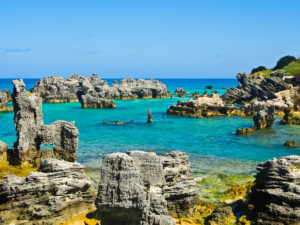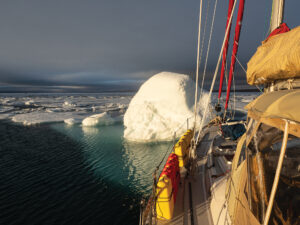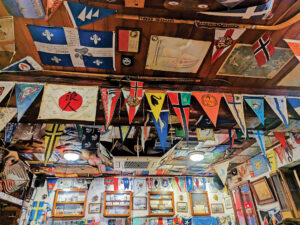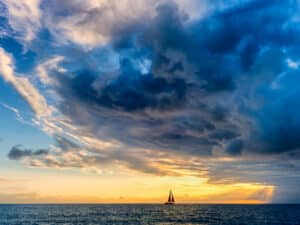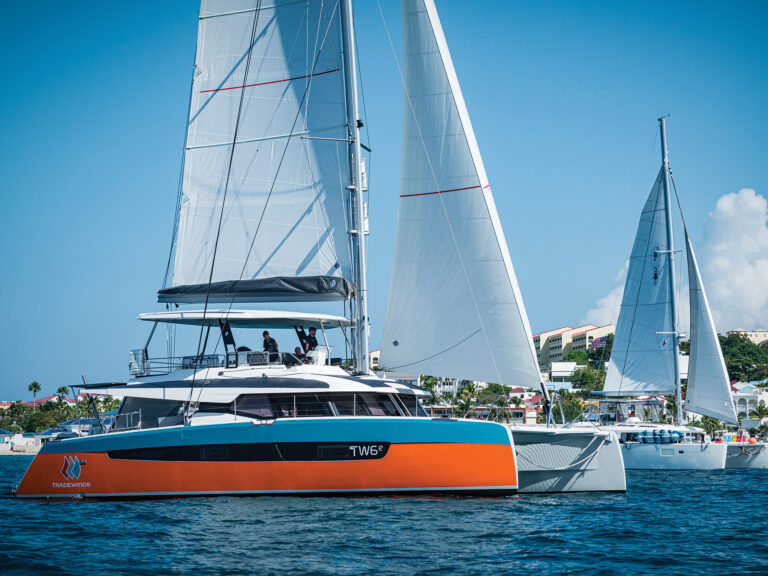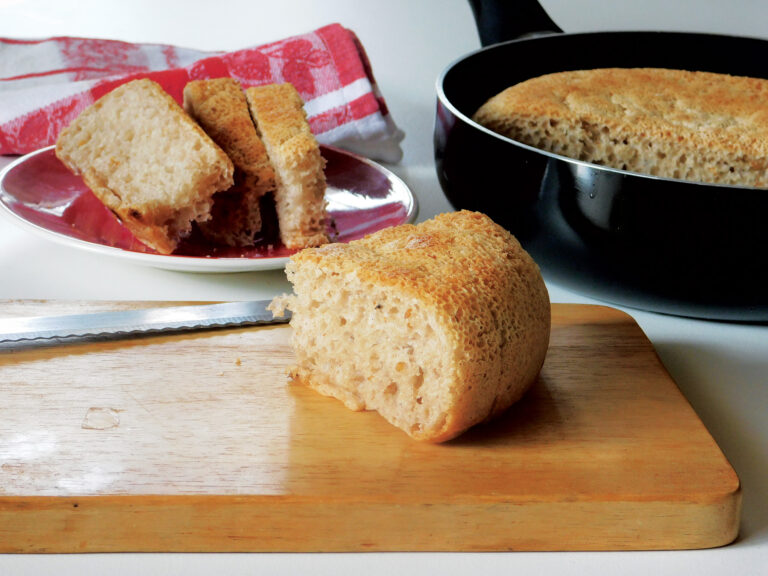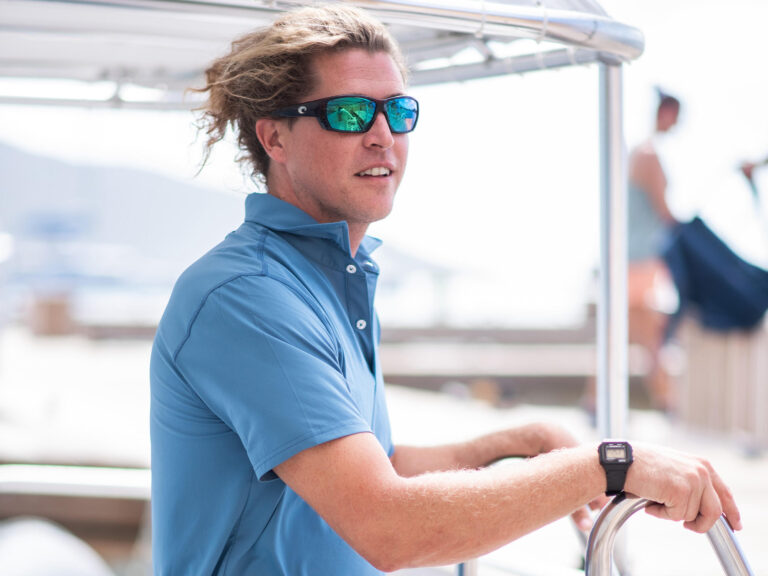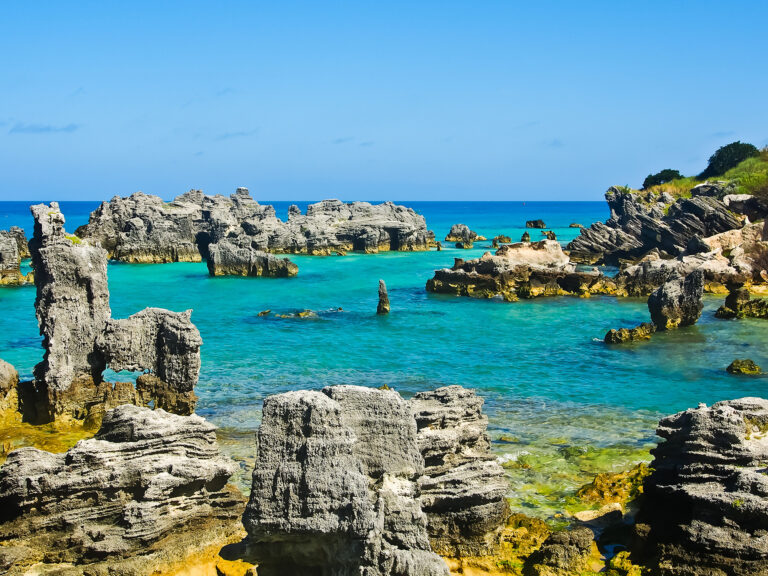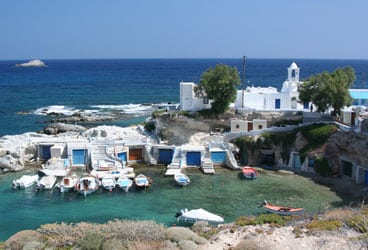
Mílos, Greece
“But I told you!” said Carolyn in exasperation as we were about to cast off from the Finike Marina, in Antalya, on Turkey’s south coast. “This sail is totally shot!”
Alas, my wife was correct on both counts: She’d told me in Thailand, a year and 8,000 ocean miles ago, that our working jib needed replacing—and now it was obvious that the sail was almost completely worthless. Sometimes I squeeze a penny a bit too hard, and this was a perfect example. Frugality’s fine; being too cheap isn’t. I’m forever tacking between the two.
The problem was that we had neither time nor money to order a replacement headsail if we wanted to cruise in Greek waters this summer. In addition, my personal income was dropping along with everyone else’s in the West—and we were attempting to sail the same number of ocean miles on fewer and fewer pennies. When you’re truly down to the bone, it’s difficult to “cut out the extras” because there are none. Our cruising belts were so tight that it was getting hard to breathe.
But I’ve never allowed logic or rationality to get in the way of a good sail. We were in the Med. A glorious summer awaited. And I wasn’t about to allow the future to intrude on the present.
But damn it, the sad condition of this jib, which was faded and beginning to tear, was a real setback. Our engine was already running. We were just about to cast off for the Aegean Sea. “I can nurse the sail for a couple of more miles,” I said breezily. “It’s been hanging in there for 12 years and 70,000 miles. Surely I can squeeze out a few more.”
Carolyn looked doubtful.
I smiled, brushed the dark Italian hair from her lovely brown eyes, and whispered softly, “‘We sail around the world on the pennies that Scotsmen throw away,’ remember?”
We were interrupted at that point by Nadire, a Turkish cruising friend with whom we’d recently sailed the Black Sea. “Wild Card!” she was yelling while she jogged excitedly down the dock. “Wait! I have that name I was telling you about!”
Frankly, the last thing I needed was the name of yet another old friend to look up. We were drowning in ’em. We’ve learned simply to listen with politeness, then ignore all such suggestions.
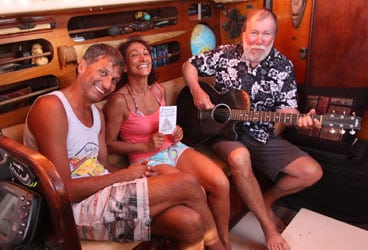
| |Cruising friends Selim and Nadire introduced the Goodlanders to Turkey and gave them ideas and contacts for their trip to the islands of Greece, the country next door.|
But we were both in love with Nadire. She was the only Turkish woman we’d ever met who sported the briefest of bikinis and a pierced belly button, in addition to a bright, friendly smile. Her muscles were totally ripped. She’d just swum the Bosphorus from Europe to Asia—and was a long-distance runner as well. To balance out the physical, she just happened to be a pediatric orthopedic physician and the author of numerous books on the subject of children’s bone disorders. Yes, you meet a lot of strange and delightful people while slithering amid the backwaters of ancient Constantinople—Nadire and her husband Selim, a professor and surgeon, were just two among many.
I looked around the boat—we really were about to cast off—and smiled resignedly. Yet another interruption! But the key to the cruising life is switching gears and being in the moment. So I sighed, shut off our warming diesel, and graciously asked Nadire if she’d like a cup of tea.
“If a Turkish person is awake, they want a cup of tea,” she said in happy reply.
As Carolyn rattled her kettle in the galley, I asked Nadire, “And what’s so special about this Greek guy in, um, Milktoast?”
“Mílos,” Nadire corrected me. “As in the famous statue of Venus in the Louvre. You’ve seen it?”
“Yes,” I said. “Classic pornography at its best. Alas, the poor dear lost her arms in some sort of a tug-of-war between early antiquity buyers as she was being smuggled out of Greece by a Frenchman.”
Nadire dismissed me with a wave of her petite arm. “In Mílos lives a sailor by the name of Pana. ” Then she strung together about 20 incomprehensible vowel sounds.
Yes, Greek is “all Greek” to me. I can’t fathom any of the strange-sounding names of the people or the destinations—and have thus taken to just sticking on the first pseudo-sounding label that comes to mind.
“And what’s this fellow Papa Gosh’s claim to fame?” I asked.
Nadire’s English is very good, but she looked perplexed. “He is just—himself, Fatty,” she said. “But he isn’t a mere man. He’s a force of nature. He’s a human being, yeah, but he’s also an adventure, a story. He is, how you say—a character? They call him the King of Ouzo—but he’s more than that. He embodies all of Greece. Totally. If you only visit one place in Greece, and you only meet one man—it has to be here, and it has to be him.”
I rolled my eyes. The Turks are so passionate, so loving, so—crazy! I’d just let Nadire read a pre-publication copy of my latest how-to marine book, and she’d been far too effusive in her praise. The only part of the manuscript that puzzled her was how often I’d mentioned the word “karma” in a missive about yachting on a shoestring. But I’m getting ahead of myself here.
A week or so later, Carolyn and I were both finally decompressing into Full Cruising Mode. She’d fallen into her Kindle, and I was lost in marlin-spike seamanship. We’d already completely forgotten what day of the week it was. The only problem was our crowded Psérimos anchorage.
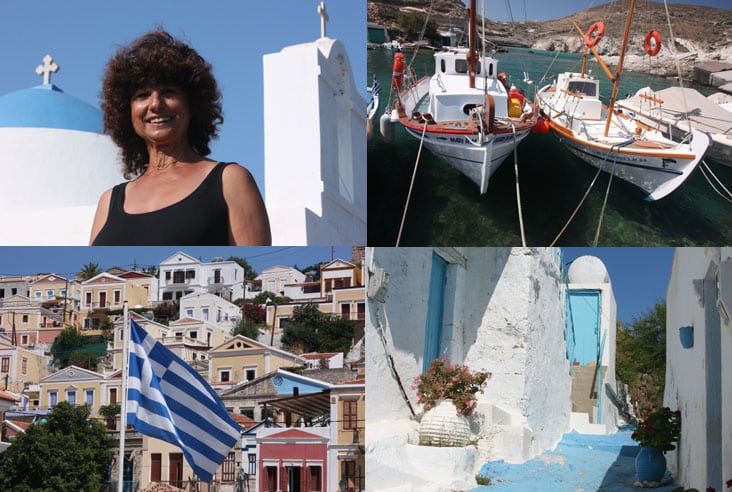
Perhaps we’d anchored in the only good holding spot. Anyway, a number of boats had anchored the proper distance ahead of us, then dragged down while setting. Now two boats, the giant catamaran Papillion from England and the small monohull Froggy from Sweden, had ended up too close. At first I’d glared at them, before I caught myself. Hell, I don’t own the ocean or its anchorages. To atone for my selfishness, I rowed over and invited them to Wild Card for sundowners. Bill and Lois, the Brits, were a tad skeptical. “Don’t worry,” I reassured them. “I’m not selling anything. We’re just desiring the pleasure of your company.”
A few hours later, we were all are laughing in the cockpit of Wild Card as Lou Lou and Pelle vividly described their wonderful North Sea adventures aboard Froggy. We quickly became cruising buddies, easily bound together by our mutual love of the sea. Just before leaving, Bill asked to buy one of our books, but I turned him down. “No commerce,” I scolded as I gave him a complimentary limited edition, signed and numbered, that we’ve privately printed for just such occasions.
“You know, we could use the money,” said Carolyn, ever the practical one, later that evening as we prepared for bed.
“Yeah, we could,” I added. “But friends are more valuable than customers, even if you never see them again.”
A week later, we were sailing in the lee of Kálimnos when we were hit by our first meltemi. It was far stronger than I’d been led to believe, with ferocious 45-knot gusts accompanied by vicious, choppy seas.
BANG!
At first, I was perplexed. It sounded like a cannon shot, loud and stunning. We were deeply dipping our rail to port. Then I ducked as a white dove fluttered past my head.
A white dove?
No, wait a minute. They were billowing paper towels blowing in the wind astern. Huge paper towels. Two-meter by two-meter Dacron towels, being dispersed by a 42-foot-long paper-towel dispenser on our forestay.
These were the disjointed thoughts that ran through my head as our long-suffering headsail shredded itself into the furious, frothing Aegean Sea.
That old UK-Halsey jib had been mighty good to us. “Rest in peace,” I muttered, looking astern.
Carolyn and I both sat in dead silence for a while. We now had no serviceable headsail. True, we could limp along under our storm staysail salvaged from a dumpster, but only at a snail’s pace. And, we planned on sailing about 7,000 miles in the near future.
We looked at each other glumly. “OK, navi-guesser,” I said wearily to Carolyn. “We need a place to lick our wounds and catch our breath, someplace with good protection from a meltemi.”
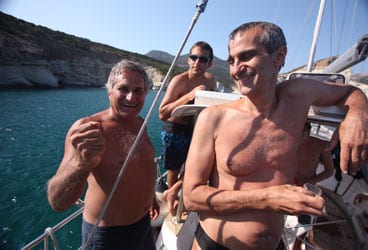
She ducked below and started scanning the chart, rattling off goofy names with too many vowels. Then I abruptly stopped her: “If we ease sheets and crack off, can we still lay Mílos?”
We’d barely rattled out the anchor chain in front of the bustling port town of Adámas, at Mílos, when an inflatable dinghy approached. It appeared to be carrying a smile, a smile so huge it obscured the man beneath it.
“No more scope! ” he cried. “Take up the anchor! We’re sailing to Kléftiko! I am the one you call Papa Gosh. Nadire called and said you might appear. Anyway, we’re going just around the corner, and it’s the very best place in all of Greece! You can follow me in Glicki.”
You only get one chance at a first impression, and the one that Papa Gosh (more accurately know as Panagiotis Avgidis) made on us was huge. First, there was the megawatt smile. And the big, proud nose, like Alexander the Great’s. He was also barrel-chested, suntanned, sturdy, and glowing with robust health. Mostly he just grinned, a maniacal, demented, enticing grin as bright as the Greek sun.
There was also something Old World and gracious about him, as if we’d be doing him a huge favor to comply with his modest request.
Frankly, the last thing I wanted to do was go back to sea, so I was amazed to hear myself happily agreeing to do just that. The Grin grew even wider as I spoke. “Don’t worry,” the Grin said. “You are with Papa Gosh of Mílos now—and everything and anything will work out perfectly!”
Gliki turned out to be a gleaming Hallberg-Rassy 46 whose decks were awash with Greek movie stars, local doctors, and a gang of scientists from, amazingly, the University of Minnesota.
“She said he was a force of nature,” mused Carolyn as both our vessels hoisted our luffing mainsails side by side. “It’s the grin,” I agreed. “He’s just so happy! I dunno, he’s like sunlight or something.”
Carolyn cracked up. I grinned back. She said, “He’s treating us like long-lost family, and we don’t even know him!”
Kléftiko turned out to be an amazing place, full of giant pools of water amid the lofty rocks, just perfect for spider-webbing two yachts into. We were soon aboard the pristine Gliki, which was so bright and shiny next to our shabby, storm-weary Wild Card.
Papa Gosh was flitting from one conversation group to the other, playing raucous drinking games with each. I don’t drink, so I forced my wife to uphold our vessel’s honor. “Put your liver on the line for American yachting, babe,” I whispered to her. “At least match him shot for shot for a couple of rounds.”
“I’d die of alcohol poisoning within minutes of consuming that much ouzo,” she said, totally intimidated by the man’s prodigious intake.
It was quite a boat party, spinning more wildly out of control with every bottle uncorked.
At some point, Papa Gosh wanted to let out more scope on his anchor, and he started to go aft to switch on his windlass.
“Just let out the clutch,” I suggested.
“It doesn’t work that way,” said Papa Gosh. “I wish it did. It’s a pain to always have to use the electrics. I even called the factory in Sweden and complained about it, but they said this windlass model only lowers electrically.”
Now frankly, there’s something about expensive, pristine yachts that bring out the devil in me. Plus everyone was drunk and I wasn’t, which always puts me in a feisty mood.
“Do you have a jackhammer?” I asked. “Or maybe some explosives?”
For the first time, I saw Papa Gosh’s smile slip. His teak decks were immaculate. He might be crazy, but he was neat crazy. He glanced nervously over to the rust-streaked, gelcoat-gouged hull of Wild Card.
“Er, no,” he said.
“Then give me a sledgehammer,” I demanded. “Give me the biggest one you’ve got on board.”
He came up from the engine room with a decent-sized ball peen hammer.
“It’ll have to do,” I said. “Any eye protection? Or some headphones to dampen the sound? No? Well, we’ll just have to take our chances, then.”
By this point, the entire party had stopped and gathered around the foredeck to watch. Some shielded their eyes; others held their ears.
I dramatically reared back the hammer as if to strike a mighty blow, but then I only barely tapped the salt-stuck (and now unobtrusively unclutched) chain gypsy as the chain began to gently pay itself out with gravity.
Suddenly, the grin on Papa Gosh’s face relit with the intensity of the sun. “I thought you said you were a writer,” he said in astonishment.
“Sailor first,” I corrected him.
We didn’t just visit Mílos with Papa Gosh. We lived it; we reveled in it. We were totally swept up within his roving, ever-changing entourage, from restaurant to nightclub to bakery. Somehow, Papa Gosh carried his own invisible spotlight with him. Everywhere he casually strode, he was a star, a conquering hero, the very center of attention.
Oh, sure, he was witty and clever and gracious, and in a dozen languages at the same time. “Forgive me,” he once told me as a solicitous Iranian waiter was tamping our aromatic nargile pipes, Arabic hookahs filled with flavored tobacco. “I have to switch to Farsi for a few moments.”
Yes, he had a yacht in Mílos, an apartment in Athens, a family house here, and some waterfront property to build a taverna there, but he was extremely modest about his “up by his own bootstraps as petroleum engineer” life story.
“Money isn’t the car,” he told me a number of times. “It’s just the keys to car. What’s important in life is this meal, these friends, this loving family—all the rich and joyous laughter surrounding us.”
Most of our time together in Mílos now seems like one long Greek food orgy. Papa Gosh knew each chef on the island personally, and lunch was always a three-hour, four-bottle affair.
Did we want to meet Angelika, the school marm? Vassilys, the miner? George, the resident horticulturist? Maria, the tax collector? Menedemus, the harbormaster?
We were greeted like visiting royalty everywhere we went on Mílos. “Any friend of—what is the amusing American-ism you use?—of the Papa Gosh is friends with us.”
Weeks flew by. We didn’t think or plan or strategize. We just gulped it in. We didn’t learn Hellenic culture, we inhaled it. This was truly Greece, and these were her glorious, history-kissed people. We just allowed it to wash over us like a joyous wave, and we were swept away by the crazy, carefree hedonism of it all.
When Papa Gosh heard we needed a new headsail, he told us he’d bring back one from Athens, just the right size, as he’d once had a 38-foot sloop very similar to Wild Card.
When would he be able to bring it back?
“Ahh,” he said with mock sadness. “I have neither wristwatch nor calendar. I’m like a leaf in the Aegean wind. So, perhaps, my timing is a bit imprecise. But I think I’ll return to Mílos on Tuesday, and I’ll bring the sail with me then.”
Suddenly, Papa Gosh was gone, and reality flooded back into our world vision. Mílos was now diminished to just another Greek isle, lovely perhaps, but the larger-than-life magic was gone.
Alas, Papa Gosh didn’t show up for weeks, and we heard bizarre tales of his dancing on this island, kayaking on that island, and storm-sailing with a Saudi prince on yet a third.
Finally, I couldn’t take it any longer, and (horrors!) called him on the mobile phone he occasionally carried. At first, it was obvious he didn’t place me in his memory banks, and, then, even worse, that he’d totally forgotten about the sail. “So you couldn’t find the sail?” I finally blurted out to confirm. He screamed in shocked remembrance and dropped the phone. Moments later, the phone was snatched back up. “I have the sail bag in my hand,” he said proudly. “I will bring it back with me, on Tuesday!” he said.
Another week went by without news.
Jimmy, an old cruising buddy from the Gulf of Aden, sailed in aboard Blue Moon and tossed us a used headsail from a Tartan 31, which would likely be far too small. Still, we eagerly awaited Papa Gosh’s return.
The rumor on the docks now was that Papa Gosh had been called back to Japan—no, Oman, for an oil trade—wait, no, he was sighted in Istanbul, drinking vodka with some Russians.
Each day I’d tour the bustling waterfront in hopes of spotting Gliki. I soon noticed, however, a boatload of scruffy French kids aboard a very basic, very shabby 28-foot sloop, which was sticking out like a sore thumb amid the gleaming yachts.
Wild Card was, at this point, anchored far, far away from town in solitary splendor, and so I grew rather concerned when, a few days later, I discovered the unkempt French kids anchored right alongside us. Worse, they were staring intently at me as I came and went in the dinghy.
I’m not by nature a suspicious person, but I’m not stupid, either. I started double-locking my companionway and carefully setting my burglar alarm. Better safe than sorry.
Then I realized with a jolt that, without Papa Gosh’s influence, I was waiting. But life is to be lived, not merely planned for. So I dropped all expectations, and at the precise moment I did so, I happened to glance over at the four French hippies on the boat next door who were staring so intently at me, obviously discussing me at this very moment.
So I hopped in my dinghy, rowed over the few feet that separated us, and said, “Bonjour! We’d like to invite you all for dinner tonight aboard Wild Card.”
Their English wasn’t good, and they were confused. “All four of us? Is de dinner with, like, the food and such?”
When I gently informed Carolyn a few hours later that we were having guests, she sighed. “Well, since they’re French, we can’t feed them garbage,” she said and headed ashore to shop.
They turned out to be four of the nicest aspiring young sailors we ever had the good fortune to meet. “We came over and anchored the hook beside you,” one explained tentatively, “because we want to put an inner forestay on our boat, and heard that you had done so, and that you were good cruising guy. But then, we know our English no good, so we get shy!”
We had a wonderfully rowdy meal together. They insisted on returning in the morning to hoist me aloft for a little masthead rewiring job I’d planned. We gave them, as always, one of our special books, signed and numbered.
While a watched pot never boils, it often bubbles immediately once you glance away. As we were saying good-bye to our French guests, running lights appeared alongside—and a grinning Papa Gosh appeared on Gliki‘s rail, casually tossing over a sail bag on the way to his mooring.
The minute the bag hit the deck, I knew it was all wrong.
Wrong!
I’d waited in vain, stupidly. It wasn’t the right size and shape, and it bounced wrong. I peered in. It was a brand-new spinnaker, not a jib.
I sighed, glumly, and noticed the sail bag Jimmy on Blue Moon had dropped off. Maybe it wasn’t too terribly small after all. It was a windless night with a full moon, and I was now truly up the proverbial creek without a paddle. What did I have to lose? So I hoisted up the Jim’sal, which had evidently been stuffed in the wrong sail bag, because it fit our 42-foot hoist like a glove.
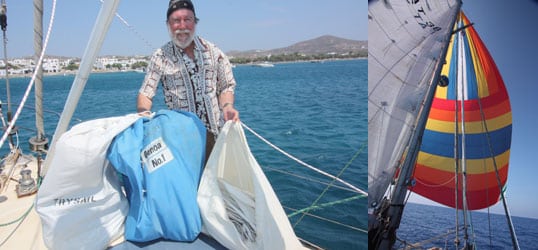
As Papa Gosh rowed up after dropping off his guests, I was internally laughing about the absurdities of the cruising life and its amazing, beautiful ironies. Papa Gosh took it all in cosmic stride. “So I brought back a different sail, and the one you wanted arrived because you waited. Excellent! Now you have two new sails for Wild Card, a jib and a spinnaker. What did I tell you, Fatty, when we first met? Not to worry, eh? That everything would be all right, correct? Well? Isn’t it?”
I had to admit that it was, better than any sailor with empty pockets could possibly hope for.
The following morning, after I’d been hoisted aloft by the French boys, Carolyn and I headed out on the next leg of our 7,000-mile journey back to St. John, in the U.S. Virgin Islands. It was rough outside the harbor. Wild Card romped along at eight knots with her new racing Jim’sal from North Sails. There was a lot of spray and wind. I knew I’d be losing cellular coverage soon, so I dialed Nadire’s number in Istanbul fast. It wasn’t easy to hear her voice on the other end, so I quickly blurted out my story of Papa Gosh and the Right/Wrong Sail. I wasn’t sure we were still connected, but then I heard her laughing. “I get it, Fatty, I get it! It’s karma!”

